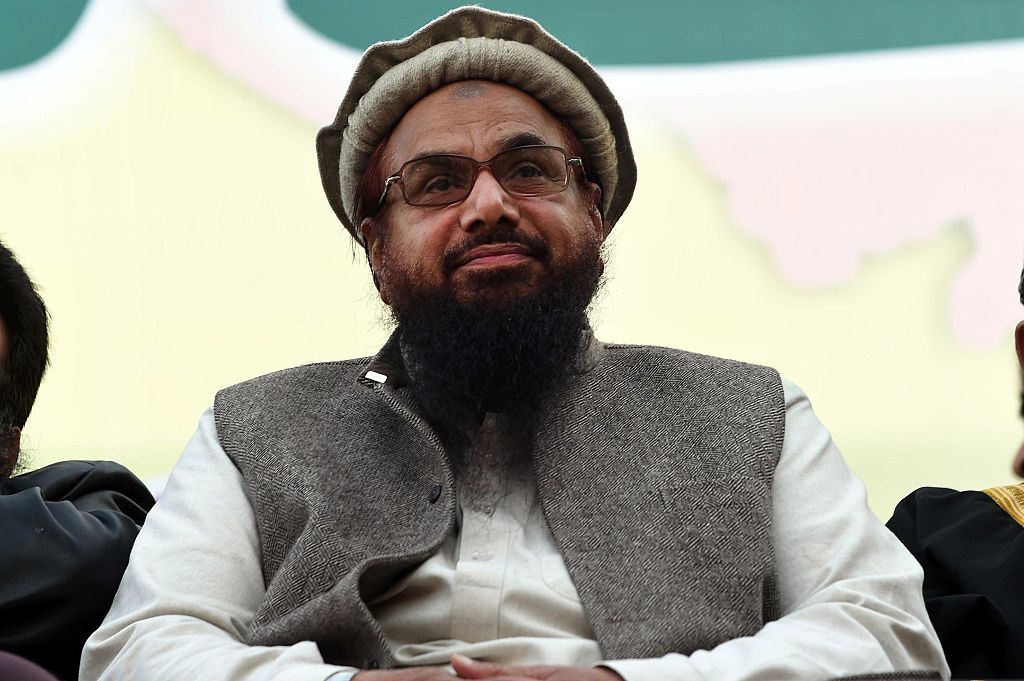
Pakistani supporters of Islamist leader Hafiz Saeed staged small protests on Tuesday and condemned the United States, after police detained the accused architect of an attack on the Indian city of Mumbai that killed 166 people in 2008.
Saeed, pointed to by critics as evidence of Pakistan's reluctance to crack down hard enough on militants, was held late on Monday at the headquarters of his charity before being placed under house arrest at his home in the eastern city of Lahore. He denies involvement in the Mumbai attack.
The move follows a U.S. visa ban by President Donald Trump aimed at countries deemed linked to terrorism, and, while Pakistan was not named, a Pakistani official said worry over the new administration was a factor in the decision. Pressure from key ally China may also have played a role, according to senior Pakistani officials, who say Beijing has for months been quietly lobbying Islamabad to crack down on Saeed and other Islamist leaders.
"Release Hafiz Saeed!... Anyone who is a friend of the U.S. is a traitor!" chanted about 150 members of Saeed's Islamic charity Jamaat-ud-Dawa (JuD) in the southern city of Karachi.
About 500 protesters shouted similar slogans outside the provincial assembly in Lahore. Demonstrations also were held in Islamabad, according to the JuD, which the United States says is a front for the Lashkar-e-Taiba (LeT) militant group blamed for the Mumbai attack.
Saeed founded LeT in the 1990s but later distanced himself from it.
Arch-rival India was skeptical that Pakistan would bring Saeed to justice, pointing out that he had been detained before and released. "Only a credible crack down on the mastermind of the Mumbai terrorist attack and terrorist organizations involved in cross border terrorism would be proof of Pakistan 's sincerity," said a statement from India's Ministry of External Affairs.
India has been demanding action against Saeed since the Mumbai raid by 10 gunmen from Pakistan, who infiltrated the city by boat and killed 166 people in a rampage that included attacks on two luxury hotels, a Jewish center and a train station. The attack brought nuclear-armed Pakistan and India closer to war, although Islamabad denied any state involvement.
Pakistan's military has long been accused of sponsoring LeT and other anti-India militants, a charge it rejects.
Saeed was placed under house arrest just after the Mumbai attacks but was released six months later when a court ruled there was insufficient evidence against him.
In recent months, Saeed has been holding regular news conferences to denounce a security crackdown in the Indian-controlled part of the divided Kashmir region. "If they believe that they can throw the Kashmir issue into the background through our arrests and our confinement, that is not possible," Saeed said as he was being led away by police.
Saeed accused the government of bowing to pressure from Indian Prime Minister Narendra Modi and the United States. "This is taking place because of Modi's insistence, Trump's pressure and Pakistan 's helplessness," Saeed told reporters.
The United States has listed both the LeT and the charity as "foreign terrorist" organizations and has a $10 million reward for information leading to Saeed's arrest.
The Pakistani government has not officially commented on why it acted now.
A senior defense ministry official said the government had not been contacted by the new U.S. administration, but it had been feeling American pressure on the issue.
"Trump is taking hard decisions against Muslim countries, there is open talk of actions against Pakistan also. So yes, this was a consideration," said the official, who declined to be identified.
Several other government officials have said recently that long-time ally China has been working to persuade Pakistan to act against wanted militants such as Saeed.
Officials in Beijing did not respond to queries on Tuesday, which falls during the Lunar New Year holiday.
Since 2007, Pakistan has been battling the Pakistani Taliban and other militants seeking to impose strict Islamic law. But critics say it has targeted only militants who attack its own state, not those active in neighboring Afghanistan and India, such as the Afghan Taliban, Haqqani network and LeT.
Uncommon Knowledge
Newsweek is committed to challenging conventional wisdom and finding connections in the search for common ground.
Newsweek is committed to challenging conventional wisdom and finding connections in the search for common ground.
About the writer
To read how Newsweek uses AI as a newsroom tool, Click here.








